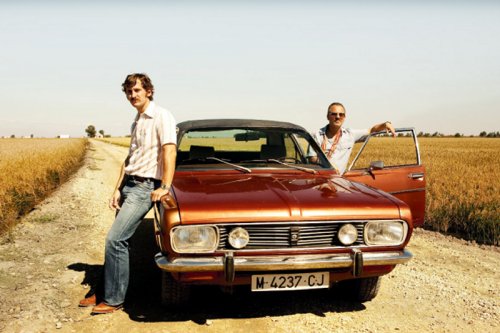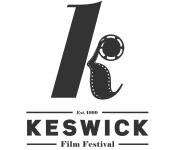Reviews - Marshland
Marshland
Reviewed By John Porter

Marshland
Sunday's Keswick Film Club screening found the harsh legacy of Franco's regime casting long shadows over the disappearance of two Andalusian teenage girls in Alberto Rodriguez' socially charged police thriller 'La isla mínima/Marshland' (2014). It is 1980, Spain is muddling around the transition of leaving Fascism behind, and Pedro (Raul Arevalo) is a young cop from Madrid given a remote assignment in the marshes as punishment for attempting to slander a high ranking official. It is clear that some old rules of silence still hold true. He is partnered up with Juan (Javier Guiterrez), a man who learnt his policing skills in a climate of oppression long before the country's shift to democracy. Under the surface of this investigative premise lies a movie ruminating on the memories of past wrongs, attempting to form not conclusions or resolution, but a portrayal of the lingering atmosphere of mistrust as old foes are seen in a new light through necessity as the times change.
The bodies of the girls are soon found, and no time is wasted in laying out a host of possible culprits and seedy connections between them. This comes complete with a soothsaying local woman who guts fish, and some fantastically emotive clue-props such as a partially scorched camera negative, an ornate penknife and an iconic bumper sticker, all under the watchful eye of flocking birds in the epic landscape around them. The editing is slick and the pacing brisk: When progress of the case seems to be gaining ground, we often find Roderiguez cutting onto the movement of walking or driving, yet proceedings never appear hurried due to the long, lazy panoramas of the marshlands themselves which are sprinkled amidst the story.
We learn little of the policemen's lives. Pedro is married. Juan is ill. Our knowledge of them is confined to their immediate time and place. We see that Juan is heavy handed: He is quick to beat suspects; he wire taps phones, acts without warrants and gets witnesses drunk to lubricate their tongues. Pedro is more idealistic, less interested in socialising, and reliant upon proponents of free speech such as a photojournalist to help him in the investigation. The character details and their histories are replaced with the wider social context. There are hints of the dark times gone and hard times to come: The photographer suspects that Juan shot a protester during the regime. Pro-Franco graffiti is seen daubed on a ruined wall. Men are poaching deer in the sun to support themselves, and workers strike while the bosses have soft hands and wear expensive cologne. Roderiguez deftly juggles personal and national consciences, before bringing them together for a haunting meeting in the single, final sequence of torrential rain after an hour and a half of Mediterranean heat.
A rich colour scheme of beiges, oranges, and earthy tones distinguish the outdoor scenes whilst the hotel and bar interiors are bathed in misted red or green light. The most telling aspect of the cinematography though is the use of the overhead shot. Using a bird's eye perspective we see the setting from a great height, the composition laid out canvas-like as geometric puzzles of earth and water, condensing the marshes into pure form of abstract line and pigment with interlocking wiggles of blue and green and the long, straight dividing tracks of roads. As times change, the world is cast into unfamiliar, yet no less truthful shapes and we are forced to see a different viewpoint through different eyes. It will come as no surprise that the fortune telling lady sees not only with her second sight but also through her eyeballs, and soon the penknife changes hands.
It is however the oft-used plot point of, "who is the blurred figure in the picture?" that leaves the most chilling effect. Doubt is thrown across the characters, and atrocities previous and present are linked. An important Spanish movie of our time, 'Marshland' illustrates with some finesse that not only will the spectre of the regime continue to haunt, but also shifts a taut cop thriller into a bleak statement of realisation that what remains as life moves on is not the crime that has been solved, nor even the crimes left unsolved, but the continual living with uncertainty and the inability to ever fully let go of the past.
The bodies of the girls are soon found, and no time is wasted in laying out a host of possible culprits and seedy connections between them. This comes complete with a soothsaying local woman who guts fish, and some fantastically emotive clue-props such as a partially scorched camera negative, an ornate penknife and an iconic bumper sticker, all under the watchful eye of flocking birds in the epic landscape around them. The editing is slick and the pacing brisk: When progress of the case seems to be gaining ground, we often find Roderiguez cutting onto the movement of walking or driving, yet proceedings never appear hurried due to the long, lazy panoramas of the marshlands themselves which are sprinkled amidst the story.
We learn little of the policemen's lives. Pedro is married. Juan is ill. Our knowledge of them is confined to their immediate time and place. We see that Juan is heavy handed: He is quick to beat suspects; he wire taps phones, acts without warrants and gets witnesses drunk to lubricate their tongues. Pedro is more idealistic, less interested in socialising, and reliant upon proponents of free speech such as a photojournalist to help him in the investigation. The character details and their histories are replaced with the wider social context. There are hints of the dark times gone and hard times to come: The photographer suspects that Juan shot a protester during the regime. Pro-Franco graffiti is seen daubed on a ruined wall. Men are poaching deer in the sun to support themselves, and workers strike while the bosses have soft hands and wear expensive cologne. Roderiguez deftly juggles personal and national consciences, before bringing them together for a haunting meeting in the single, final sequence of torrential rain after an hour and a half of Mediterranean heat.
A rich colour scheme of beiges, oranges, and earthy tones distinguish the outdoor scenes whilst the hotel and bar interiors are bathed in misted red or green light. The most telling aspect of the cinematography though is the use of the overhead shot. Using a bird's eye perspective we see the setting from a great height, the composition laid out canvas-like as geometric puzzles of earth and water, condensing the marshes into pure form of abstract line and pigment with interlocking wiggles of blue and green and the long, straight dividing tracks of roads. As times change, the world is cast into unfamiliar, yet no less truthful shapes and we are forced to see a different viewpoint through different eyes. It will come as no surprise that the fortune telling lady sees not only with her second sight but also through her eyeballs, and soon the penknife changes hands.
It is however the oft-used plot point of, "who is the blurred figure in the picture?" that leaves the most chilling effect. Doubt is thrown across the characters, and atrocities previous and present are linked. An important Spanish movie of our time, 'Marshland' illustrates with some finesse that not only will the spectre of the regime continue to haunt, but also shifts a taut cop thriller into a bleak statement of realisation that what remains as life moves on is not the crime that has been solved, nor even the crimes left unsolved, but the continual living with uncertainty and the inability to ever fully let go of the past.
Find A Film
Search over 1500 films in the Keswick Film Club archive.
Friends
KFC is friends with Caldbeck Area Film Society and Brampton Film Club and members share benefits across all organisations
Awards
Keswick Film Club won the Best New Film Society at the British Federation Of Film Societies awards in 2000.
Since then, the club has won Film Society Of The Year and awards for Best Programme four times and Best Website twice.
We have also received numerous Distinctions and Commendations in categories including marketing, programming and website.
 Talking Pictures
The KFC Newsletter
Talking Pictures
The KFC Newsletter
Links Explore the internet with Keswick Film Club


